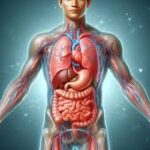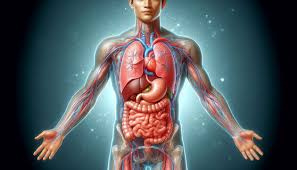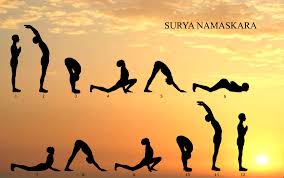The human body encompasses the complete framework of an individual. It consists of various cell types that collectively form tissues, which then develop into organs and subsequently organ systems. The human body is a sophisticated biological entity made up of various organ systems that operate together to maintain life, with every system fulfilling particular roles vital for survival, including the skeletal and muscular systems for support and mobility, the circulatory system for transporting nutrients and oxygen, the respiratory system for gas exchange, and the digestive system for nutrient processing. The body’s overall function depends on these systems, which are made up of cells, tissues, and organs like the heart, brain, and lungs. They are connected and dependent on each other, and water plays a crucial role in them. The elements that make up the human body include hydrogen, oxygen, carbon, calcium, and phosphorus. These elements exist in trillions of cells and non-cellular parts of the body.
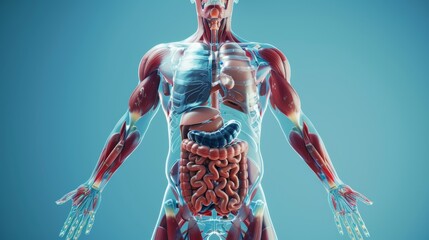
Let’s explore some general knowledge regarding human body parts; this information is useful in everyday life for everyone, especially for students engaged in human body sciences.
Human body science question 50 and answer
| Question | Answer |
| 1- Which type of blood is regarded as the universal donor? | O – negative |
| 2- What volume of blood is found in the human body? | 5-6 litres |
| 3- What gas do people breathe in and out while respiring? | Oxygen (O2) |
| 4- What is the biggest muscle in the human body? | Gluteus Maximus |
| 5- What is the number of blood groups in the ABO system? | 4 |
| 6- Which hormone regulates the body’s blood sugar levels? | Insulin |
| 7- How much does an average human heart weigh? | 300gm |
| 8- Which vitamin aids in blood coagulation? | Vitamin K |
| 9- What is the medical term for the stopping of the heartbeat and blood flow? | Cardiac arrest |
| 10- How many bones make up the human skeletal system in adulthood? | 206 |
| 11- What section of the human body produces insulin? | Pancreas |
| 12- What is the tiniest muscle in the human body? | Stapedius muscle |
| 13- Which region of the brain manages anger, fear, and body temperature? | Hypothalamus |
| 14- Which vitamin is often referred to as the ‘sunshine vitamin’? | Vitamin D |
| 15- What is the typical blood pressure for a human? | 120/80 mmHg |
| 16- How many kidneys are there in the human body? | Two |
| 17- Which organ in the body is the biggest? | Skin |
| 18- What is the biggest gland in the human body? | liver |
| 19- What is the medical term for vision loss in one or both eyes caused by injury to the optic nerve? | Glaucoma |
| 20- What is the total count of muscles in the human body? | 650 |
| 21- What is the outer layer of the human heart? | Pericardium |
| 22- What is the clinical term for the inability to move a body part? | Paralysis |
| 23- How much does the human brain weigh? | 1.36 kg |
| 24- What is the human body’s longest bone? | Femur (also known as the thigh bone) |
| 25- What condition is marked by the gradual deterioration of motor neurons, resulting in muscle weakness and wasting? | Amyotrophic lateral sclerosis (ALS) |
| 26- What is the role of the retina in the human body? | To generate a mirror view of a picture |
| 27- What is the clinical term for high blood pressure? | Hypertension |
| 28- What is the typical body temperature for humans? | 98.6°F |
| 29- What is the medical terminology for the condition in which the heart beats has an irregular or abnormal rhythm? | Arrhythmia |
| 30- What is the term for the protection of the central nervous system? | Meninges |
| 31- Which region of the brain controls essential functions like breathing and heart rate? | Brainstem |
| 32- What is the toughest material in the human body? | Tooth enamel |
| 33- What is the tiniest bone in the human body? | Stapes |
| 34- What is the primary gland of the human body? | Pituitary gland |
| 35- What is the windpipe’s scientific name or term? | Trachea |
| 36- How many milk teeth are present in the human body? | 24 ribs and 12 pairs |
| 37- What is the pH level of urine in the human body? | 6 |
| 38- What is the medical terminology for the condition marked by trouble breathing, typically due to the constriction of the air passages? | Dyspnea |
| 39- Which section makes up 80% of the brain in the human body? | Cerebram |
| 40- What is the longest muscle in the human body? | Sartorius muscle |
| 41- What is the medical term for memory loss(forgetfulness), frequently linked to aging or head (brain) injuries | Amnesia |
| 42- How many chambers are there in the human heart? | 4 |
| 43- Which neck gland secretes hormones that control metabolism? | Thyroid gland |
| 44- How many ribs do humans have in their thorax? | 12 pairs |
| 45- What is the heaviest organ in the human body? | Liver |
| 46- What is the medical terminology for a blood clot that develops in a deep vein, frequently in the legs? | Deep vein thrombosis (DVT) |
| 47- How many cells are thought to make up the human body? | 37.2 trillion |
| 48- What is the term used in medicine for joint inflammation that leads to pain and rigidity? | Arthritis |
| 49- What is the daily volume of urine produced by a healthy person? | 1500ml |
| 50- What elements make up 99% of the human body? | Oxygen, carbon, hydrogen, nitrogen, calcium, and phosphorus |
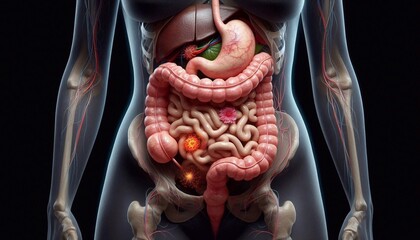
(Disclaimer: The details and information given in this article are based on common belief. “News World” does not confirm these. Please consult the relevant experts before implementing them)


